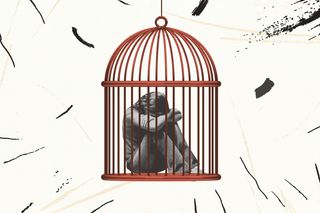
A Domestic Abuse Pandemic Is Ensuing Under Covid19 Lockdown
Women, isolated with their abusers and no escape, are reaching out via hotlines and email at much higher rates than usual.

When Prime Minister Narendra Modi announced a three-week lockdown contain the spread of Covid19, many heaved a sigh of relief, thinking the safety of their homes would protect them from the life-threatening virus that is claiming lives across the globe. The news, however, was not welcomed by all; women and children stuck in abusive relationships, for example, are now finding themselves more trapped than ever, with no respite and no escape.
Between March 23 and March 30, the National Commission for Women (NCW), which runs a domestic violence hotline, saw an uptick in complaints of abuse. In the span of a mere seven days, they received 58 complaints, much higher than usual, the Press Trust of India reports. “The number has increased. Men are frustrated sitting at home and are taking out that frustration on women,” Rekha Sharma, NCW India chairperson, told PTI.
Around the world, complaints of domestic abuse have increased as people begin to settle into isolation. In Hubei, China, for example, domestic violence reports made to the police tripled under lockdown in February, from 47 to 162 reports, The Guardian reports. Brazil, Germany, Greece, the United Kingdom, and Australia have all witnessed an uptick in calls made to domestic violence hotlines since the coronavirus pandemic began, as women trapped in abusive households are increasingly disconnected and alienated from the outside world.
“In a normal situation, when a woman is undergoing domestic violence, she has her escape — her husband goes to work, her children go to school, and she gets a breather,” said Nayreen Daruwalla, Program Director for the prevention of violence against women and children at Mumbai-based non-profit SNEHA. “But when the woman is not even in the position to cope, then domestic violence is going to be on the rise,” she says, adding that SNEHA receives at least two to three complaints every day — again, much higher than usual.
There are two factors that have given rise to this situation, according to Daruwalla. First is the increased frustration due to the lockdown; Daruwalla cited a recent complaint in which a woman was “beaten black and blue” by her husband who had been recently laid off due to the Covid19 pandemic. Second, there is heightened pressure from family members on women to fulfill gender roles, such as housework and care work, regardless of the physical or mental health of the women. Daruwalla recalls another complaint in which a woman attempted to leave her home because she was being abused and expected to bear the brunt of the household tasks despite being nine months pregnant.
Related on The Swaddle:
Know Your Rights: Navigating Domestic Violence Laws In India
The numbers that both Sharma and Daruwalla cite, however, don’t relay the whole picture. “The 58 cases include only those complaints received via email. The real figure is likely to be more since the bulk of complaints come from women in the lower strata of society who send us their complaints by post,” Sharma told PTI.
“Women in extreme situations are managing to reach out to us via email or hotline,” Daruwalla says, “but those we know are in violent, perhaps not extremely violent, situations are remaining silent. They don’t want to talk about it because they’re surrounded by their abusers and other family members all the time.” The women SNEHA work with — from the underprivileged slum areas of Mumbai – were able to register complaints with community outreach volunteers before the lockdown. Now, with their mobility restricted, these women have lost an important avenue. Another avenue through which women registered their complaints was via the post, according to Sharma. Deemed a non-essential service, the post has been discontinued along with other such services, for the time being, cutting off yet another channel of communication for these women.
What, then, is the solution? In France, which has witnessed a 30% spike in domestic abuse complaints, officials announced a plan to direct 1 million euros towards housing domestic violence survivors in hotels with the help of advocacy organizations, setting up assistance booths in grocery stores and pharmacies across the country, NPR reports. A similar plan could work in hospitals in India, Daruwalla says, which women frequent for pregnancy-related and mental health issues.
However, considering the Indian government’s track record in tackling domestic abuse in India — marital rape is still decriminalized, for example –it is not prudent to wait for the government to establish standardized complaint processes. In the meantime, Daruwalla says, organizations like SNEHA are providing remote counseling services – both to domestic abuse survivors and their families, if needed – and offering to connect callers to safe shelters. With movement massively restricted, however, Daruwalla says that shelters are also operating either at full capacity or in fear that women will be questioned while being transported to their facility. One solution is to train the police tasked with patrolling areas to identify and accommodate domestic violence survivors, Daruwalla says. She adds that although police intervention might not solve the problem, it can at least delay it until normal lines of communication can resume. For the time being, however, NGOs are taking up the charge to receive and address complaints of abuse, battling the systemic challenges facing women and children at risk.
The coronavirus pandemic might be dominating news headlines, taking up a majority of space in people’s minds and changing life as we know it. But it is imperative to remember that some of the world’s social evils, especially gender-based violence, usually rear their heads when everything else falls apart, leaving women to inevitably become the ones who bear the brunt.
Rajvi Desai is The Swaddle's Culture Editor. After graduating from NYU as a Journalism and Politics major, she covered breaking news and politics in New York City, and dabbled in design and entertainment journalism. Back in the homeland, she's interested in tackling beauty, sports, politics and human rights in her gender-focused writing, while also co-managing The Swaddle Team's podcast, Respectfully Disagree.
Related


Brazilian Mafia Enforce Covid19 Curfews After President Bolsanaro Dismisses Pandemic
